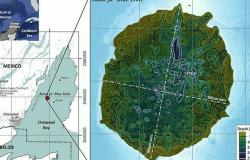On Thursday 25 April, NRK reported that Hamas is interested in concluding “a long-term ceasefire”, but with “demanding conditions”. It was good that Middle East correspondent Yama Wolasmal found out that the one condition that Hamas sets is that all descendants of Arab-Palestinian 1948 refugees must have the right to move into Israel. In other words, Hamas says it is willing to enter into a five-year ceasefire after Israel agrees to dissolve itself as a Jewish state. Hamas also demands that Israel withdraw completely from Gaza and the West Bank.
NRK’s presenter then asked the correspondent about the realism of this.
Yama Wolasmal: “So, if we are to base international law on it, then Hamas will be right in international law in much of what they demand. The UN has long since established that the occupation of Israel is illegal, it must end. The UN has also stated that Israel must withdraw from the West Bank, which is a Palestinian area – which the entire international community agrees on, yet in the last 30-40-50 years it has been seen that Israel has deliberately built settlements there, and they has transferred around 6-700,000 settlers who live in Palestinian territory in total violation of international law. The UN has also said that Palestinian refugees have the right to return to their homes.”
Here there were at least three serious errors.
Error 1
No, the UN has not determined that the occupation of Israel is illegal. MIFF caught Aftenposten in the same error in January 2023, and the newspaper then had to come up with a correction. The newspaper failed to provide a single example of the UN having determined that the occupation is illegal. At the latest in 2017, the UN special rapporteur wrote that “the usual approach in the international community has been to regard Israel as a lawful occupier of Palestinian territory” (our emphasis).
In December 2022, the UN General Assembly asked the International Court of Justice to issue a legal opinion on Israel’s presence in the West Bank. The goal of the anti-Israeli majority in the UN General Assembly is to get the court to declare the occupation illegal. Such a measure would not have been necessary if Wolasmal’s claim had been correct.
There is nothing in Resolution 242 (adopted after Israel took control of the West Bank and Gaza in 1967) that describes Israel’s occupation as “illegal” and it does not mention “international law” either directly or indirectly. The resolution, which came about through hard and in-depth negotiations between members of the Security Council, must be seen as a whole, and taking one phrase out of context gives a false impression of both the content and purpose of the resolution.
It is also particularly worth noting point 1 ii, i.e. that all states must be respected in the area as a prerequisite for a just and lasting peace. It is perhaps worth noting that this resolution formally has no force under international law either, as it was adopted under Chapter VI of the UN Charter.
We are aware that the UN General Assembly has adopted more resolutions about Israel than any other country, but it is firstly worth noting that these resolutions do not have any force under international law either, but rather express the political opinion among a majority of countries that are members of the United Nations.
Error 2
No, the UN has not determined that Israel must withdraw from the West Bank, which is a Palestinian area.
It appears from Resolution 242 and the Oslo Accords that Israel is only obliged to withdraw from the West Bank in exchange for a possible lasting, negotiated peace.
Error 3
It is also incorrect and extremely flawed when Wolasmal claims that the UN has “said that Palestinian refugees have the right to return to their homes”.
Resolution 194 was adopted by the UN General Assembly on 11 December 1948. Like all other resolutions from the General Assembly, it is not binding, and Israel’s Arab neighbors voted against it. The text also required that refugees who returned had to be prepared to “live in peace with their neighbors» (paragraph 11). There was no prospect of that in 1948 and there is no prospect of that in 2024 either.
The Palestinians base their claim of a legal “right of return” to the sovereign state of Israel on paragraph 11 of General Assembly Resolution 194 (III) of 11 December 1948 entitled “Palestine – Progress Report of the UN Mediator”. This resolution established a reconciliation commission to mediate a solution to the conflict. In that connection, it included provisions around the negotiation of a final agreement (paragraph 6), holy sites (paragraph 7), Jerusalem (paragraphs 8–9), facilitation of economic development in the area (paragraph 10) and refugees (paragraph 11).
Indians in South Africa are a vulnerable minority. They were also 76 years ago. But Wolasmal does not come up with resolution 265 from the UN General Assembly (adopted on 14 May 1949) in that context. It is pointless to demand the implementation of nearly 76-year-old proposed solutions when they were rejected by the relevant parties at the time and the reality has changed radically. The UN General Assembly passed a number of resolutions in the late 1940s and 1950s that Wolasmal never cares about. The double standard is only used when it can affect Israel.
If Palestinian refugees had been treated like other refugees, their situation would have been resolved during the 1950s, at the latest during the 1960s. For the Palestinians, refugee status has been maintained and passed on for generations. Only a tiny minority of a few tens of thousands of elderly Palestinians out of over five million Palestinians classified as refugees have actually fled. The UN’s discrimination against Palestinian refugees is immoral. Norway is helping to maintain a rapidly growing ragtag proletariat, millions of people who live on other people’s handouts. LO people, who enjoy work, should be the first to distance themselves from this.
Resolution 194 does not create any legal rights. The General Assembly’s resolutions are by nature political declarations that cannot confer legal rights. Furthermore, section 11 does not say anything about an absolute “right to return”. It only accepts that “refugees who wish to return to their homes and live in peace with their neighbors, should be allowed to do this … and that compensation should be paid for the property of those who choose not to return…” (emphasis added). The use of the word “should” and not “must” confirms that this paragraph is not about the Palestinians’ legal rights, but about seeking to find a solution to the conflict. The word “allowed” also suggests that the final decision on whether refugees should be allowed to return should be left to the area’s authority, that is Israel.
So far Wolasmal’s fault. He is to be commended for concluding his reply by reproducing some Israeli counter-arguments. But he clearly needs to update himself on international law.
Wolasmal: “But in reality, it is very unlikely that any of this will happen because the Israeli authorities have made it very clear over the past decades that the return of Palestinian refugees will not happen, which, among other things, they are worried about in that case, is that the demographics of Israel will change. Israeli authorities have time and again said that this is the only place where Jews – as Jews can call home, we have to be in the majority here, if you allow refugees to return to the State of Israel from – that is, Palestinian refugees, then it will change the composition of the population. They must rather settle in neighboring countries and secure their rights there, has been the signal from the Israeli authorities, so in practice what Hamas demands is very, very unlikely to be implemented by Israel.”





